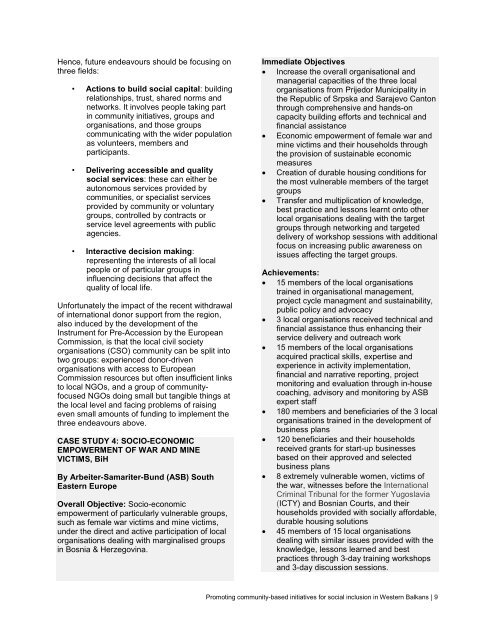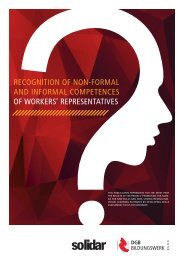Promoting community-based initiatives for social inclusion ... - Solidar
Promoting community-based initiatives for social inclusion ... - Solidar
Promoting community-based initiatives for social inclusion ... - Solidar
Create successful ePaper yourself
Turn your PDF publications into a flip-book with our unique Google optimized e-Paper software.
Hence, future endeavours should be focusing on<br />
three fields:<br />
• Actions to build <strong>social</strong> capital: building<br />
relationships, trust, shared norms and<br />
networks. It involves people taking part<br />
in <strong>community</strong> <strong>initiatives</strong>, groups and<br />
organisations, and those groups<br />
communicating with the wider population<br />
as volunteers, members and<br />
participants.<br />
• Delivering accessible and quality<br />
<strong>social</strong> services: these can either be<br />
autonomous services provided by<br />
communities, or specialist services<br />
provided by <strong>community</strong> or voluntary<br />
groups, controlled by contracts or<br />
service level agreements with public<br />
agencies.<br />
• Interactive decision making:<br />
representing the interests of all local<br />
people or of particular groups in<br />
influencing decisions that affect the<br />
quality of local life.<br />
Un<strong>for</strong>tunately the impact of the recent withdrawal<br />
of international donor support from the region,<br />
also induced by the development of the<br />
Instrument <strong>for</strong> Pre-Accession by the European<br />
Commission, is that the local civil society<br />
organisations (CSO) <strong>community</strong> can be split into<br />
two groups: experienced donor-driven<br />
organisations with access to European<br />
Commission resources but often insufficient links<br />
to local NGOs, and a group of <strong>community</strong>focused<br />
NGOs doing small but tangible things at<br />
the local level and facing problems of raising<br />
even small amounts of funding to implement the<br />
three endeavours above.<br />
CASE STUDY 4: SOCIO-ECONOMIC<br />
EMPOWERMENT OF WAR AND MINE<br />
VICTIMS, BiH<br />
By Arbeiter-Samariter-Bund (ASB) South<br />
Eastern Europe<br />
Overall Objective: Socio-economic<br />
empowerment of particularly vulnerable groups,<br />
such as female war victims and mine victims,<br />
under the direct and active participation of local<br />
organisations dealing with marginalised groups<br />
in Bosnia & Herzegovina.<br />
Immediate Objectives<br />
Increase the overall organisational and<br />
managerial capacities of the three local<br />
organisations from Prijedor Municipality in<br />
the Republic of Srpska and Sarajevo Canton<br />
through comprehensive and hands-on<br />
capacity building ef<strong>for</strong>ts and technical and<br />
financial assistance<br />
Economic empowerment of female war and<br />
mine victims and their households through<br />
the provision of sustainable economic<br />
measures<br />
Creation of durable housing conditions <strong>for</strong><br />
the most vulnerable members of the target<br />
groups<br />
Transfer and multiplication of knowledge,<br />
best practice and lessons learnt onto other<br />
local organisations dealing with the target<br />
groups through networking and targeted<br />
delivery of workshop sessions with additional<br />
focus on increasing public awareness on<br />
issues affecting the target groups.<br />
Achievements:<br />
15 members of the local organisations<br />
trained in organisational management,<br />
project cycle managment and sustainability,<br />
public policy and advocacy<br />
3 local organisations received technical and<br />
financial assistance thus enhancing their<br />
service delivery and outreach work<br />
15 members of the local organisations<br />
acquired practical skills, expertise and<br />
experience in activity implementation,<br />
financial and narrative reporting, project<br />
monitoring and evaluation through in-house<br />
coaching, advisory and monitoring by ASB<br />
expert staff<br />
180 members and beneficiaries of the 3 local<br />
organisations trained in the development of<br />
business plans<br />
120 beneficiaries and their households<br />
received grants <strong>for</strong> start-up businesses<br />
<strong>based</strong> on their approved and selected<br />
business plans<br />
8 extremely vulnerable women, victims of<br />
the war, witnesses be<strong>for</strong>e the International<br />
Criminal Tribunal <strong>for</strong> the <strong>for</strong>mer Yugoslavia<br />
(ICTY) and Bosnian Courts, and their<br />
households provided with <strong>social</strong>ly af<strong>for</strong>dable,<br />
durable housing solutions<br />
45 members of 15 local organisations<br />
dealing with similar issues provided with the<br />
knowledge, lessons learned and best<br />
practices through 3-day training workshops<br />
and 3-day discussion sessions.<br />
<strong>Promoting</strong> <strong>community</strong>-<strong>based</strong> <strong>initiatives</strong> <strong>for</strong> <strong>social</strong> <strong>inclusion</strong> in Western Balkans | 9
















